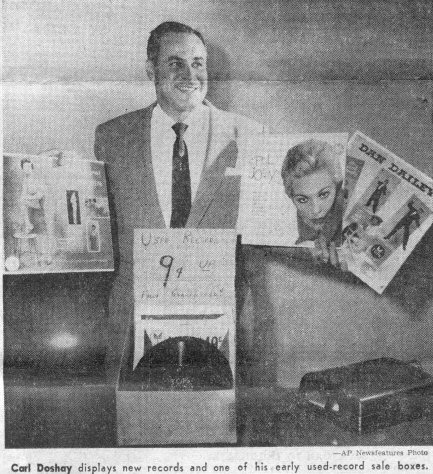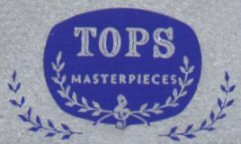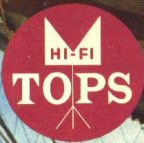
 Tops Records Story, Part 2
Tops Records Story, Part 2
From the Providence (RI) Sunday Journal, December 29, 1957 (courtesy of Carl Doshay)
Record Maker Got His Start Peddling Old Jukebox Discs
By GENE HANDSAKER
LOS ANGELES — (AP) — Ten years ago Carl Doshay was peddling used phonograph records from
cardboard bins in supermarkets. Today he has a record factory he says will gross five million dollars in
sales this year.
"That's wholesale," adds the 38-year-old president of Tops Records. "Retail, eight million."
Once he had to sneak his cartons of juke-box castoffs into some markets to show managers
that housewives would buy them at nine to 29 cents each. Now he hires stars like Ann Sothern, Dan
Dailey, Connie Haines, James Melton and Lena Home to make long-play hi-fi albums. The discs sell in
grocery, drug, department and dime stores for $1.49 — less than half the cost of major labels whose
racks
have moved in beside them. Sales in both categories have been stimulated, Doshay says.
"We help each other. Somebody comes in to buy a King Cole (Capitol) and buys one of ours, too. And
vice versa."
Doshay, who says he'll sell nearly 10 million records this year, aims his discs at teenagers and
housewives who can't afford higher prices of better known labels. His albums are sold in more than
7,000
supermarkets and drug and department stores.
But his success didn't happen overnight.
Ten years ago he sold his watch-repair business in his native New York City for $10,000 to buy a turkey
ranch in Southern California. He had been stationed here in the Air Force and liked the climate. His
money
became tied up in escrow proceedings delayed by the death of the ranch's former owner.
Doshay, living in a tiny apartment with his wife and two children, had to bring in some cash. Hitchhiking
to
a possible opening for a salesman, he asked a truck driver about the load of old phonograph records he
was carrying. The driver said he was hauling them to the city dump for jukebox operators who had
replaced them with newer hits.
"Go ahead, take a few for yourself," the driver invited. Doshay did. That night he played some on a
borrowed record-player.
"Certainly not new," he recalls musing, "but they could be worth a few cents. Why throw playable records
away?"
Next morning he packed about 25 in an open cardboard box and wrote with crayon on the side: "Your
favorite old records, nine cents and up." He took them to record stores. Managers turned him down flat,
declaring such a sideline would ruin their business in new records.
Starting home, Doshay went to a supermarket to buy groceries. He set the box of records on a counter
while he shopped. Housewives flocked about the old records. He asked one woman to return the discs
she had selected, "I will not!' she said. "Buy your own records!'
At that instant Doshay got his big idea: sell records in supermarkets. He made a deal with the manager
simply by bringing him over to the crowd of milling housewives.
A friend since boyhood, Sam Dickerman, a garment cutter, came here from New York to join Doshay in
the new enterprise. They needed money to buy more records from juke-box operators. Doshay's
$10,000
was still in escrow. A bank official told him: "Get some additional security and I'll recommend an interim
loan until your money clears."
Doshay decided to build the business until it would serve as the security. He scurried from store to store
with cartons of old records he had bought from juke-box operators with his dwindling funds, for from one
to six cents apiece.
He'd see that the store had customers, walk in quietly with his carton and set it on a counter. Waiting
until
housewives had begun picking records, he would introduce himself to the manager and sell him on the
idea.
"Sometimes they respect a man who has enough push to do something like that," Doshay says.
In six days he opened enough accounts to satisfy the bank. Juke-box operators were glad to have
Doshay
haul away their old records by the thousands for as low as a penny apiece. Occasionally he'd find a
collector's item like a rare Crosby and sell it for $5 to $10.
A carpenter friend built record racks in his spare time. Doshay painted them. Eventually he had 400
used-record outlets in Los Angeles and nearly 1,500 in 11 Western states. The markets got 40 per cent
of
the price. Doshay and his partner grossed $50,000 that first year, 1947, and in time were buying records
all over the country.
In 1950 they decided to make their own records of current hit Songs; pricing them far below competitors
and still selling them in markets. Their first record, "My Happiness" and "Hair of Gold," was made with
unknown musicians Doshay found in a night spot in Los Angeles' Negro district. He retailed it at 39 cents
and:
"It sold everywhere we put it. We were reaching the mass teen-age public that couldn't afford a 79-cent
record."
The partners sold their used-record operation at a profit to another firm, Julian Brown Enterprises, Inc.,
and moved from a small plant into a two-story, half-million-dollar factory — a former mattress works —
south of downtown. Two hundred employees work two shifts stamping out, labeling, packaging and
shipping 33, 45, and 78-r.p.m. records. There are offices in Chicago and New York.
On making a business prosper, Doshay says: "With a little imagination and good merchandising policies,
there's room for growth."
And on top of Tops he has his ranch: 255 acres, 14,000 chickens and a few hogs — in the west end of
the
San Fernando Valley.

 Back to the Tops/Mayfair Story
Back to the Tops/Mayfair Story Back to the Discography Listings Page
Back to the Discography Listings Page  Back to the Both Sides Now Home Page
Back to the Both Sides Now Home Page